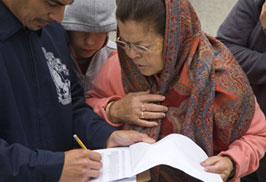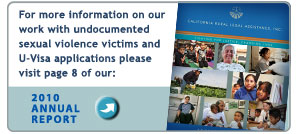
The majority of sexual harassment cases won and/or settled by CRLA include measures to implement broad reforms in the workplace. Photo by David Bacon.
Felicia Espinosa, directing attorney at the CRLA Fresno migrant office, litigates sexual harassment cases running the gamut from straightforward, small claims, to complex, multi-year battles. The harassment represented in these cases often includes constant verbal harassment, unwanted touching, threats, and rape. For every case of this type the CRLA Fresno office sees, Espinosa knows there are many more that go unreported.
 "It's rarely just one woman in a workplace who's being harassed or threatened," says Espinosa. "For every woman who comes to the office, she's representing other women who are afraid to say anything."
"It's rarely just one woman in a workplace who's being harassed or threatened," says Espinosa. "For every woman who comes to the office, she's representing other women who are afraid to say anything."
Although 90% of female farm workers report sexual violence in the workplace as "a major problem,"1 the actual cases brought to court in rural communities like Fresno, where Espinosa works, are far fewer than that national average would imply. Says Espinosa, "The cases we see being litigated are nowhere near representative of the harassment that is happening out there."
Because of CRLA's mission, the organization takes on cases with an eye for systemic change beyond individual compensation for clients. This is significant because the majority of sexual harassment cases won and/or settled by CRLA include measures to implement broad reforms in the workplace. Such measures aim to change the culture of the workplace long after a client's individual case is settled.
1 Source: Maria M. Dominguez, Sex Discrimination & Sexual Harassment in Agricultural Labor, 6 Am. U. J. Gender & Law 231, 255 (1997); see also Richard Kamm, Extending the Progress of the Feminist Movement to Encompass the Rights of Migrant Farmworker Women, 75 Chi.-Kent L. Rev. 765, 774-75 (2000).


